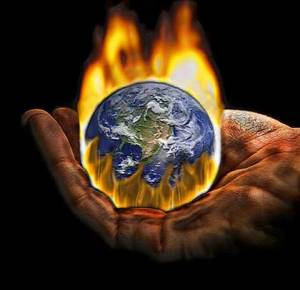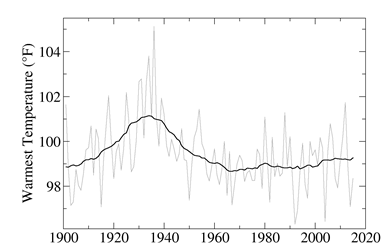 Summary: Like all of Krugman’s work, we can learn much from his latest column about climate change. See this annotated version to see how he shows why 30 years of climate crusading has produced so little policy action in the US.
Summary: Like all of Krugman’s work, we can learn much from his latest column about climate change. See this annotated version to see how he shows why 30 years of climate crusading has produced so little policy action in the US.
Krugman is a brilliant economist, with a knack for explaining technical details to the general public. He is also an insightful political analyst, albeit of the left-wing hack kind. In yesterday’s column he shows us the latter in action — and why three decades of climate activism has accomplished so little.
“It’s Not Your Imagination: Summers Are Getting Hotter.” So read a recent headline in The Times, highlighting a decade-by-decade statistical analysis by climate expert James Hansen. “Most summers,” the analysis concluded, “are now either hot or extremely hot compared with the mid-20th century.”
Krugman starts with a look at the past. Hansen’s graphs in the New York Times are what Edward Tufte calls “chart junk” in his classic work about graphics — they lack a scale for the change in temperature. All we know is that summers have grown warmer. How much? The article does not say.
— they lack a scale for the change in temperature. All we know is that summers have grown warmer. How much? The article does not say.
 — they lack a scale for the change in temperature. All we know is that summers have grown warmer. How much? The article does not say.
— they lack a scale for the change in temperature. All we know is that summers have grown warmer. How much? The article does not say.
For a wider perspective see this graph from the Executive Summary of the Third Draft of the Climate Science Special Report, part of the Fourth National Climate Assessment. (CCSR of NCA4). Oddly, it is not in the current Fifth Draft. It shows the hottest day in the 48 contiguous US States by year. The line has been rising since the 1960s, but remains below the levels during the long Dust Bowl. The real message here is that individual graphs can look spectacular, but no one graphic — no matter how animated — can capture the complexity of climate change.
“Extreme Hot Days Dominated by 1930s Dust Bowl.”
A still wider context shows another picture. America and Europe have been warming for two centuries, since the Little Ice Age ended. The IPCC’s AR5 Working Group I describes the anthropogenic part of that long warming: “It is extremely likely (95 – 100% certain) that human activities caused more than half of the observed increase in global mean surface temperature from 1951 to 2010 {link}.”
So what else is new? At this point the evidence for human-caused global warming just keeps getting more overwhelming, and the plausible scenarios for the future — extreme weather events, rising sea levels, drought, and more — just keep getting scarier. …
It’s fun to see climate activists make menacingly vague statements and support them by pointing to a voluminous reports, as Krugman does here — pointing to the 673 page-long draft CCSR. Let’s see if we can do better. The key relevant section is “4: Climate Models, Scenarios, and Projections.”
“Over the next two decades, global temperature increase is projected to be between 0.5°F and 1.3°F (0.3°–0.7°C) (medium confidence). This range is primarily due to uncertainties in natural sources of variability that affect short-term trends. In some regions, this means that the trend may not be distinguishable from natural variability (high confidence).
“Beyond the next few decades, the magnitude of climate change depends primarily on cumulative emissions of greenhouse gases and aerosols and the sensitivity of the climate system to those emissions (high confidence). Projected changes range from 4.7°–8.6°F (2.6°–4.8°C) under the higher RCP8.5 scenario to 0.5°–1.3°F (0.3° 1.7°C) under the lower RCP2.6 scenario, for 2081–2100 relative to 1986–2005 (medium confidence).”
So the report does not prophesize doom with the certainty Krugman implies. In fact, it does what activists seldom do — explicitly state the certainty of its conclusions (the IPCC’s reports also do this). We might get tolerable rise of 0.5°–1.3°F under RCP2.6 — the most favorable of the four scenarios in the IPCC’s AR5 report (it might be easy to do; see these details). On the other extreme, their worst-case RCP8.5 scenario is nightmarish but unlikely.
What becomes clear to anyone following the climate debate, however, is that hardly any climate skeptics are in fact trying to get at the truth. I’m not a climate scientist, but I do know what bogus arguments look like — and I can’t think of a single prominent climate skeptic who isn’t obviously arguing in bad faith.
A sensible person would stop reading with this pitiful attempt to delegitimize scientists who disagree with him. Only hard-core hacks write like this. Climate activists describe prominent climate scientists like Roger Pielke Sr. and Judith Curry as “skeptics”. Krugman’s description is quite mad applied to them.
Take, for example, all the people who seized on the fact that 1998 was an unusually warm year to claim that global warming stopped 20 years ago — as if one unseasonably hot day in May proves that summer is a myth.
With this science denial Krugman shows the brotherhood of the far-right and far-left. Here he vaguely refers to what climate scientists call the “pause” or “hiatus”. Hundreds of papers in peer-reviewed journals and reports have discussed this since the early ones in 2009. Scores discussed evidence showing the pause. After that was well-established, scores discussed possible causes of the pause (a debate still not resolved). Some discuss when the pause will end (with the 2015 El Nino either making a pause in the pause, or more likely ending it). Those links go to posts with citations, abstracts, and links to a sample of 150 papers about the pause.
Or all the people who cited out-of-context quotes from climate researchers as evidence of a vast scientific conspiracy.
I agree with Krugman on this, and have written several posts about it (for example, here).
Or for that matter, think of anyone who cites “uncertainty” as a reason to do nothing — when it should be obvious that the risks of faster-than-expected climate change if we do too little dwarf the risks of doing too much if change is slower than expected.
This is a creative use by Krugman of the false dilemma logical fallacy to mischaracterize his opponents. The alternatives are not a binary do nothing or something. The world faces many serious threats in addition to climate change (details here and here). We have limited resources and must allocate them wisely among these threats. Krugman does the usual climate activist trick of focusing on the fringe that denies the reality of global warming — and ignoring the serious debate about how much warming, when, with what effects. Understanding those is necessary for effective policy action.
It is not too late. Climate scientists can restart the climate change debate – & win. For more information about this see putting this proposal in a wider context of science norms and the climate science literature.
For More Information

No comments:
Post a Comment